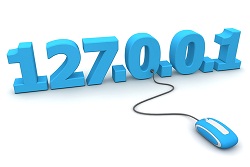IPv4 is the current standard for internet protocol addressing across the world, and has become synonymous with internet users all over the globe. The familiar ‘xxx.xxx.xxx.xxx’ format is well known to anyone with a slight understanding of how the internet works. Domain names and domain name servers happily supply locations on the web with a handy textual reference, which means visiting a website does not require the input of a dot-decimal number (e.g. 192.168.10.10). Instead, a web address such as http://www.bbc.co.uk/ can be used, which itself finds the numerical IP address meaning the user doesn’t have to. This is all a good thing of course, and until now has worked very well.
 The problem which has been expected for some time now is beginning to come to light. IPv4 is the fourth revision of the IP addressing system, allowing around 4 billion unique numerical combinations. Naturally, the overwhelming and rapid growth of the internet since the 1980’s has meant these addresses have gone quickly. It is suspected that they will have been fully exhausted by 2012.
The problem which has been expected for some time now is beginning to come to light. IPv4 is the fourth revision of the IP addressing system, allowing around 4 billion unique numerical combinations. Naturally, the overwhelming and rapid growth of the internet since the 1980’s has meant these addresses have gone quickly. It is suspected that they will have been fully exhausted by 2012.
A new addressing method was required for the continual growth of the internet. A number of alternatives have been conceived over the years, none more promising than IPv6.
IPv6 allows for a almost unquantifiable number of addresses, with the official number standing at 340,282,366,920,938,463,463,374,607,431,768,211,456, which is unlikely to ever run out. This will secure the future of the internets addressing platform.
So what does this mean for users of IT services across the globe? Firstly, home users should not worry. Internet service providers will handle the switch for you. If new equipment is required for new users, this will be provided to you by any ISP making the switch. Existing customers will likely remain on IPv4 until any major changes are required.
The circumstances are slightly different for commercial users however. It is very important to select providers who will be crossing over to the new IPv6 platform with a network architecture that supports such a change. High end top-level networking equipment must support IPv6 as a protocol for it to function. Because of this any dedicated sever platforms taken out in the very near future with a need for large IP blocks will have to ensure IPv6 compatibility to sustain growth.
Netwise Hosting only utilise fibre links from providers who already support IPv6 ready for the change. Our internal networking infrastructure will be following suit soon, with full support for both IPv4 and IPv6. If you are looking for a trouble free, growth-oriented service solution long into the future, Netwise Hosting are more than able to step upto the challenge whilst remaining the most cost-effective dedicated server provider in the UK market.

Surely all these are gone now?!